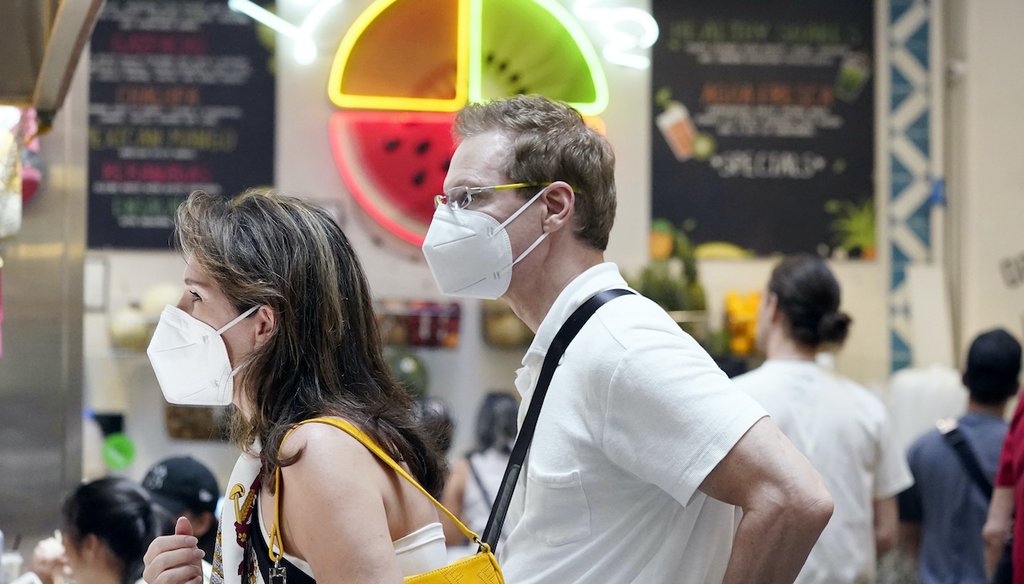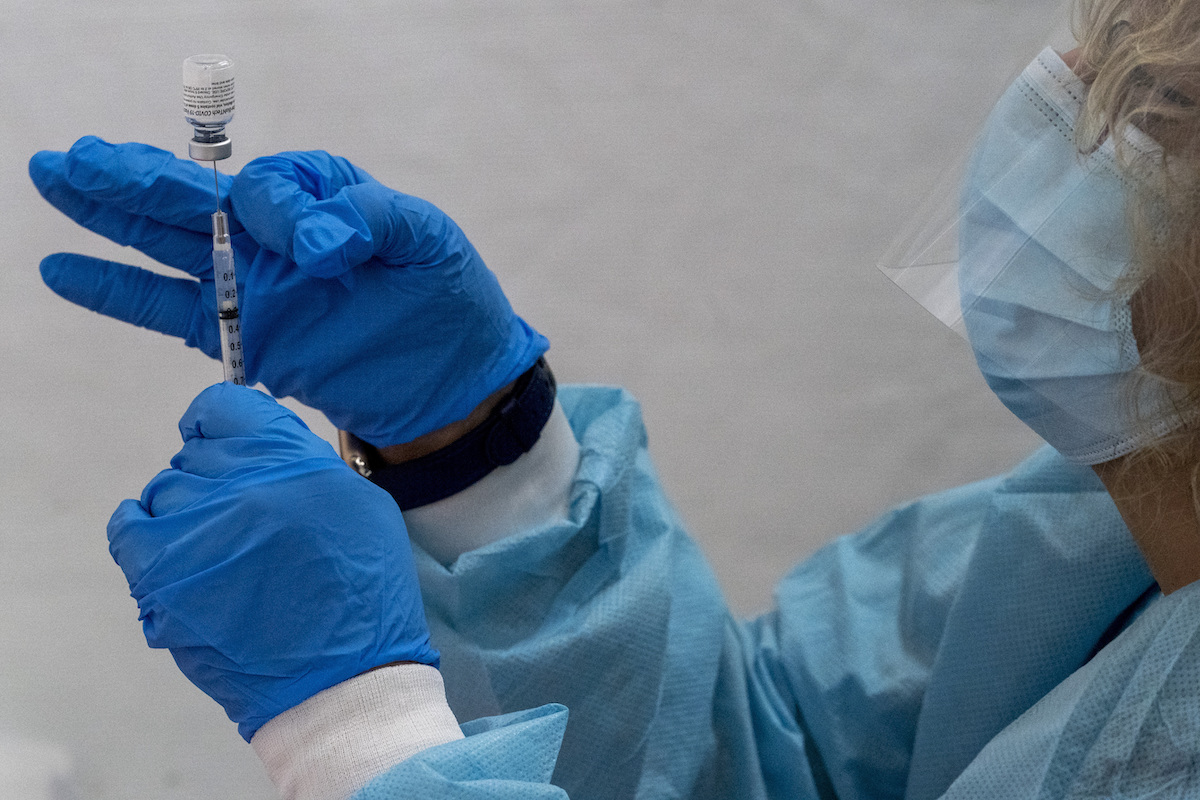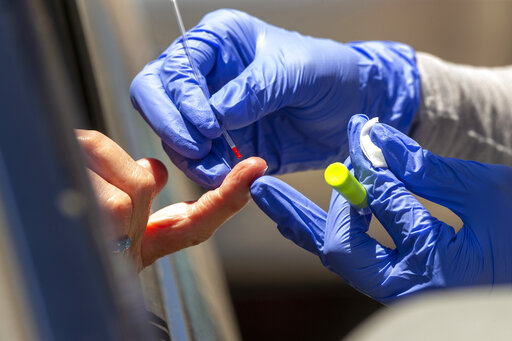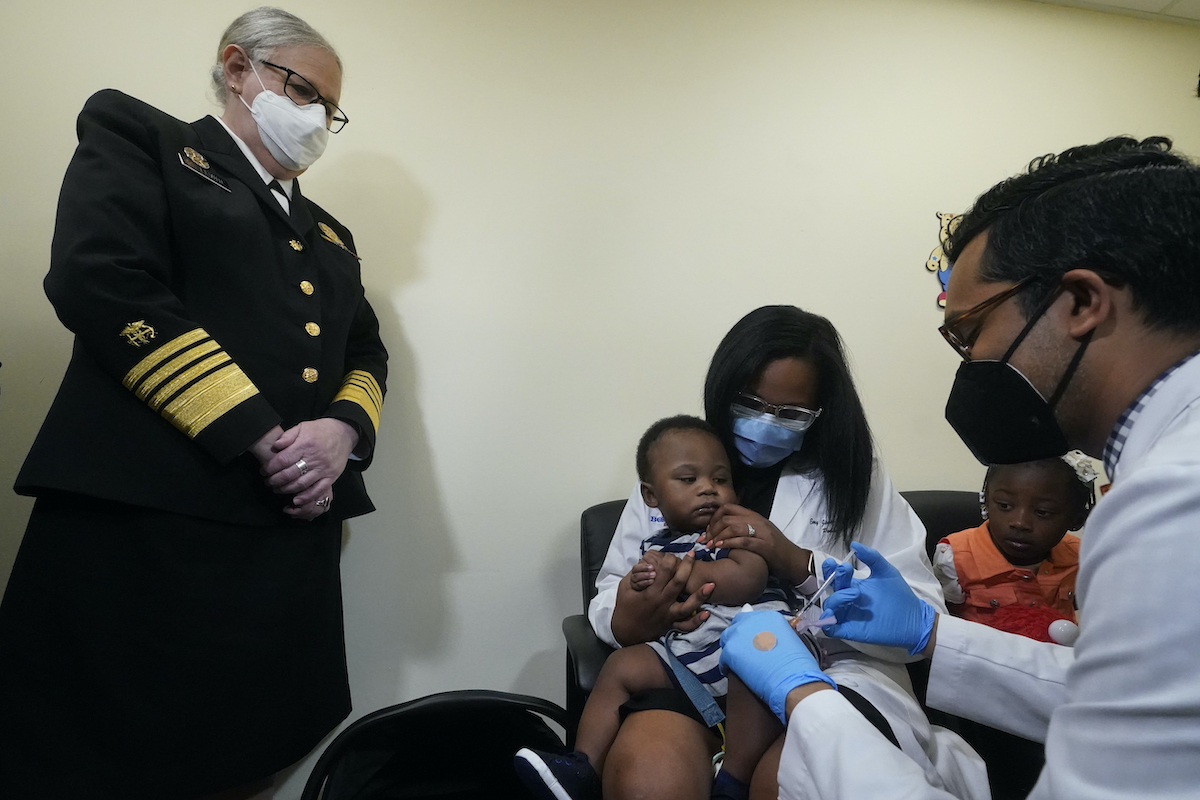Stand up for the facts!
Our only agenda is to publish the truth so you can be an informed participant in democracy.
We need your help.
I would like to contribute

Masked patrons wait to order at a food stand inside Grand Central Market on July 13, 2022, in Los Angeles. Los Angeles County might be imposing a mask-wearing mandate on July 29 if COVID-19 numbers continue to rise. (AP)
If Your Time is short
-
The risk of reinfection for people who have some immunity to COVID-19 is determined by their level of exposure to the virus and the strength of their immune response, experts said.
-
The potential long-term risks of repeated COVID-19 infections aren’t fully known, but some research suggests that reinfections can increase someone’s risk of significant long-term health problems.
-
Immunity conferred from prior COVID-19 infections can be comparable to vaccine-induced immunity, experts said, but in both cases, the effectiveness of that immunity wanes over time.
More than two years into the COVID-19 pandemic, the majority of Americans now have some level of protection against the novel coronavirus. Millions have been vaccinated or have recovered from a prior infection, yielding antibodies that provide varying degrees of immunity.
Although that immunity may stave off the most dire of infections, it isn’t foolproof, and it doesn’t always prevent a person from getting COVID-19 a second time — or even a third or fourth time.
BA.5, a highly contagious omicron subvariant, is now the dominant cause of COVID-19 infections in the U.S., the Centers for Disease Control and Prevention reported.
Although COVID-19 vaccines are now widely available, reinfections have risen in recent weeks. Years into the pandemic, experts said that’s unsurprising. Virginia Pitzer, an associate professor of epidemiology at the Yale School of Public Health, said being infected with COVID-19 more than once will likely become the norm.
"We’re going to be living with COVID, reasonably for the rest of our lives, and reinfections are going to continue to occur," Pitzer said.
Sign up for PolitiFact texts

A pharmacist fills a syringe with the Pfizer-BioNTech COVID-19 Vaccine ( rebranded Comirnaty) at a vaccination site in the Bronx borough of New York. (AP)
Who is at risk for COVID-19 reinfections?
Everyone who was at risk of getting infected with COVID-19 once is at risk of being reinfected.
Reinfections and post-vaccine breakthrough infections are now common, said Marta Galanti, a postdoctoral research scientist at Columbia University who has studied coronavirus reinfections since the COVID-19 pandemic’s early days. Vaccination and prior-infection immunity will still protect against severe disease, but that protection wanes over time, she said.
Reinfection risk is determined by the level of exposure to the virus and the strength of a person’s immune response, said Dr. Stuart Ray, a professor of medicine in Johns Hopkins Medicine’s Division of Infectious Diseases.
People’s behavior and the rate of COVID-19 transmission in their communities influence their level of exposure to the virus, he said. People’s exposure levels might be higher, for example, if they’re regularly in crowded and poorly ventilated places — or if they are in close contact with someone who has COVID-19 and is at their most infectious (early in their infection). In contrast, a person’s level of exposure might be lower if the COVID-19 transmission rate in their community is low.
The strength of a person’s immune response will vary based on their health and risk factors and how recent their COVID-19 infection or vaccination was.
Which COVID-19 variants are circulating will also affect a person’s likelihood of reinfection, Pitzer said.
"Your immunity against, say, a variant that was circulating back in late 2020 … is going to be less protective, particularly against the new BA.5 variant that’s become dominant in the U.S. and other parts of the world currently, than, say, an infection that occured a month ago, with a more closely related virus," she said.
As people age, their immune systems weaken. Therefore, older people might be more susceptible to reinfections. People who are immunocompromised might also face heightened risk.
There are COVID-19 antibody tests, but Ray said they aren’t as informative as people might think.
"I’ve tested my own antibodies and I have some results, but when I ask myself or other experts about what those results mean, we don’t quite know," he said. "We don’t really know what antibody levels equate to what degree of immunity."

A health worker takes a blood sample for a COVID-19 antibody test in Los Angeles on May 20, 2020. (AP)
Ray, who has cared for COVID-19 patients since the pandemic started, said he has seen breakthrough infections and reinfections "within a few months."
In April, the CDC reported that at least 10 people in four states had tested positive for an omicron-variant COVID-19 infection less than 90 days after they’d tested positive for a prior delta-variant infection. Those reinfections occurred 23 to 87 days apart, the report said.
Health officials in Australia recently recommended reducing the period someone should be considered immune after testing positive for COVID-19 to 28 days.
How big of a deal are reinfections, anyway?
Researchers are looking closely at whether COVID-19 — and reinfections of COVID-19 — can lead to additional health risks down the line.
While the full picture is still unknown, some research has shed a bit of light on the matter.
People who’ve recovered from a single COVID-19 case — whether mild, moderate or severe — are at a higher risk of cardiovascular and mental health problems in the months that follow, according to studies by Veterans Affairs researchers who relied on a database of veterans’ medical records.
Ray offered some anecdotal insight as well. "I’ve taken care of a number of people who had COVID a few months ago and are now disabled from their work because of these kinds of problems," he said, listing blood clots, strokes, heart attacks, low blood pressure when standing, depression and difficulty concentrating as problems.
That’s just from a single infection.
But a June study, which has not been peer-reviewed but also relies on VA data, found that reinfections carry similar significant long-term health risks. Although experts said a study of veterans might not apply to the general population, Ray said they show people should still be cautious.
"People should be thinking that they’re better off not getting infected than just getting infected and ignoring it," Ray said. "We’re seeing signs that it carries a cost."
How well does my immunity protect me?
Whether people gain COVID-19 immunity from vaccines or from prior infections, immunity wanes over time.
One’s risk of infection rises six months after their most recent COVID-19 vaccine, Pitzer said.
"You are still protected against the most severe outcomes of a SARS-CoV-2 infection and the more severe disease that goes alongside that," she said. "But you’re certainly still able to become infected or even reinfected with the virus."

On June 28, 2022, in Miami, Florida, Pediatrician Emy Jean-Marie, center, holds her nine-month-old son Adedeji Adebayo, on her lap as Dr. Nizar Dowla, right, administers a vaccine while Department of Health and Human Services Assistant Secretary for Health, Admiral Rachel Levine, left, looks on. (AP)
It is difficult to compare the longevity of vaccine-induced COVID-19 immunity with immunity from prior infections, Pitzer said. Doing so would require controlling for all the factors that contribute to someone getting infected. And vaccinated people might be more likely to take additional precautions that further reduce their infection risk, she suggested.
"The real question that people have to ask themselves is how they want to gain their immunity," Ray said. "Vaccination is a whole lot safer than getting infected."
How do people avoid reinfections?
The same measures that help prevent initial COVID-19 infection also apply to reinfections, experts said. People who choose to travel or attend large gatherings put themselves at higher risk of infection.
"If you have any symptoms that are consistent with COVID-19 infection — even if it’s just a sore throat or a little bit of congestion — get tested," Pitzer said. "If you test positive, make sure you isolate and are not spreading it to other people, particularly those who might be vulnerable to a more severe outcome."
During the omicron wave, the CDC has continued to recommend that people get vaccinated, wear well-fitting masks, wash their hands regularly, social distance from people who do not live in their homes, avoid crowds and test regularly to prevent the spread of COVID-19.
Ray also encouraged people to get fully vaccinated, including getting boosters when eligible. He said wearing well-fitting KN94, KN95 or N95 masks can help reduce transmission.
"As a health care provider, I wear a mask all the time in the hospital when I’m caring for people with COVID, and I haven’t gotten COVID yet," Ray said. "I think it’s because I wear a mask very carefully."
RELATED: Ask KHN-Politifact: Is my cloth mask good enough? The 2022 edition
RELATED: Trying to keep up with the omicron subvariants? Here’s a guide
RELATED: 10 types of COVID-19 vaccine misinformation swirling online, fact-checked
Our Sources
Interview with Dr. Stuart Ray, professor of medicine in the Division of Infectious Diseases at Johns Hopkins Medicine, July 13, 2022
Interview with Virginia Pitzer, an associate professor of epidemiology at Yale School of Public Health, July 13, 2022
Email exchange with Dr. Paul Sax, clinical director of the Infectious Disease Clinic at Brigham & Women’s Hospital and a professor of medicine at Harvard Medical School, July 13, 2022
Email exchange with Marta Galanti, a postdoctoral research scientist at Columbia University, July 13, 2022
Yale Medicine, "Omicron and BA.5: A Guide to What We Know," July 6, 2022
Yale Medicine, "Omicron, Delta, Alpha, and More: What To Know About the Coronavirus Variants," July 5, 2022
Research Square, "Outcomes of SARS-CoV-2 Reinfection," June 17, 2022
Cell.com, "Antibody escape of SARS-CoV-2 Omicron BA.4 and BA.5 from vaccine and BA.1 serum," July 7, 2022
NPR, "A new dominant omicron strain in the U.S. is driving up cases — and reinfections," July 11, 2022
Australia’s ABC News, "Immune period for COVID positive cases could be reduced from 12 weeks to 28 days," July 10, 2022
Nature Communications, "Homogeneous surrogate virus neutralization assay to rapidly assess neutralization activity of antiSARS-CoV-2 antibodies," July 1, 2022
JAMA Network, "Rates of COVID-19 Among Unvaccinated Adults With Prior COVID-19," April 20, 2022
Fortune, "Stealth Omicron rates are falling in one bellwether city. But tracking case numbers is becoming harder because of at-home testing," April 27, 2022
STAT, "Growing use of home Covid-19 tests leaves health agencies in the dark about unreported cases," Dec. 7, 2021
Pan American Health Organization TV, "PAHO Press Conference on COVID-19," July 13, 2022
STAT, "Omicron variant now makes up 73% of Covid infections diagnosed in U.S.," Dec. 20, 2021
Centers for Disease Control and Prevention, "Variant Proportions 7/3/2022 - 7/9/2022," accessed July 13, 2022
Bloomberg, "People Are Getting Repeat Covid Infections More Often," May 13, 2022
Science, "More people are getting COVID-19 twice, suggesting immunity wanes quickly in some," Nov. 18, 2020
Bloomberg, "Omicron Sublineages Evade Antibodies From Earlier Infections," April 30, 2022
Centers for Disease Control and Prevention, "Reinfections and COVID-19," accessed July 14, 2022
Centers for Disease Control and Prevention, "Science brief: SARS-CoV-2 infection-induced and vaccine-induced immunity," Oct. 29, 2021
Wired, "The first repeat COVID-19 infection case isn’t all bad news," Aug. 25, 2020
Columbia University, "Direct observation of repeated infections with endemic coronaviruses," accessed July 14, 2022
Columbia University Mailman School of Public Health, "Risk of Coronavirus Reinfection Remains After Recovery," April 29, 2022
Johns Hopkins Medicine, "Breakthrough Infections: Coronavirus After Vaccination," Nov. 23, 2021
Science Direct, "Immunosenescence," accessed July 14, 2022
Nature Medicine, "Long-term cardiovascular outcomes of COVID-19," Feb. 10, 2022
JAMA Network, "The COVID Heart—One year after SARS-CoV-2 infection, patients have an array of increased cardiovascular risks," March 2, 2022
The BMJ, "Risks of mental health outcomes in people with covid-19: cohort study," Feb. 16, 2022
WebMD Health News, "Each COVID-19 reinfection increases health risks," July 7, 2022
Advisory Board, "How often can you get Covid-19? ‘At least a couple times a year,’ experts say," May 18, 2022
Centers for Disease Control and Prevention, "Notes from the field: SARS-CoV-2 omicron variant infection in 10 persons within 90 days of previous SARS-CoV-2 delta variant infection — four states, October 2021–January 2022," April 8, 2022
The New York Times, "How often can I be infected with the coronavirus?" May 16, 2022
The Guardian, "Covid reinfection: how likely are you to catch virus multiple times?" Jan. 21, 2022
NBC News, "‘Part of a new normal’: COVID reinfections are here to stay," June 16, 2022
U.S. Department of Veterans Affairs, "VA research spells out COVID's down-the-road risks for cardiovascular and mental health," Feb. 16, 2022
Centers for Disease Control and Prevention, "How to protect yourself and others," Feb. 25, 2022
Pew, "COVID antibody tests won’t tell you what you want to know," Oct. 1, 2021
Centers for Disease Control and Prevention, "Ending isolation and precautions for people with COVID-19: interim guidance," Jan. 14, 2022
Harvard Health Publishing, "If you’ve been exposed to the coronavirus," April 12, 2022


























